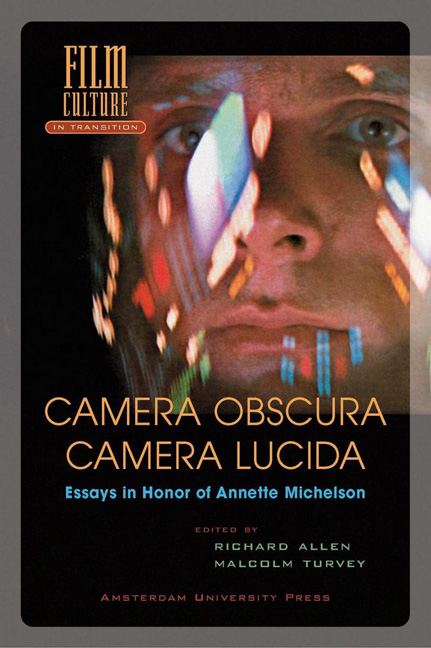Book contents
- Frontmatter
- Contents
- Acknowledgements
- Preface
- Introduction
- The Logic of an Illusion: Notes on the Genealogy of Intellectual Cinema
- Narcissistic Machines and Erotic Prostheses
- Loïe Fuller and the Art of Motion: Body, Light, Electricity and the Origins of Cinema
- Visitings of Awful Promise: The Cinema Seen from Etna
- Transfiguring the Urban Gray: László Moholy-Nagy’s Film Scenario ‘Dynamic of the Metropolis’
- Eisenstein’s Philosophy of Film
- Knight’s Moves
- Hitchcock and Narrative Suspense: Theory and Practice
- From the Air: A Genealogy of Antonioni’s Modernism
- Dr. Strangelove: or: the Apparatus of Nuclear Warfare
- Collection and Recollection: On Film Itineraries and Museum Walks
- Afterward: A Matter of Time: Analog Versus Digital, the Perennial Question of Shifting Technology and Its Implications for an Experimental Filmmaker’s Odyssey
- Select Bibliography
- List of Contributors
- Index
- Film Culture in Transition General Editor: Thomas Elsaesser
Introduction
- Frontmatter
- Contents
- Acknowledgements
- Preface
- Introduction
- The Logic of an Illusion: Notes on the Genealogy of Intellectual Cinema
- Narcissistic Machines and Erotic Prostheses
- Loïe Fuller and the Art of Motion: Body, Light, Electricity and the Origins of Cinema
- Visitings of Awful Promise: The Cinema Seen from Etna
- Transfiguring the Urban Gray: László Moholy-Nagy’s Film Scenario ‘Dynamic of the Metropolis’
- Eisenstein’s Philosophy of Film
- Knight’s Moves
- Hitchcock and Narrative Suspense: Theory and Practice
- From the Air: A Genealogy of Antonioni’s Modernism
- Dr. Strangelove: or: the Apparatus of Nuclear Warfare
- Collection and Recollection: On Film Itineraries and Museum Walks
- Afterward: A Matter of Time: Analog Versus Digital, the Perennial Question of Shifting Technology and Its Implications for an Experimental Filmmaker’s Odyssey
- Select Bibliography
- List of Contributors
- Index
- Film Culture in Transition General Editor: Thomas Elsaesser
Summary
Annette Michelson, in her multiple roles as critic, editor, translator, and teacher has made a unique contribution to the study of artistic modernism. Her thinking and taste have exerted an enormous influence – both direct and indirect – over several generations of scholars (and in some cases practitioners) of advanced film and art. This volume of essays, written by former students, by colleagues and friends, is intended to honor and build on her singular legacy. For, as I shall argue in this introduction, not only has her work greatly influenced the way modernism in both its elite and popular forms is understood, but it still has much to teach us.
It is impossible to summarize, in a short introduction such as this, all of Michelson's insights – developed in a number of seminal texts over a number of years – into the work of specific artists such as Brakhage and Snow, Morris and Kubrick, Duchamp and Cornell, Eisenstein and Vertov. In order to do some justice to the force, power, complexity, and multiplicity of her legacy, I will instead try to convey a sense of her considerable impact on Anglo-American criticism of advanced art in general, both actual and potential, since her return toNewYork in the middle of the 1960s fromfifteen years living in Paris.
This impact has been at least threefold. First of all, as Rosalind Krauss points out in her preface to this volume, Michelson was one of the first to argue that advanced artistic practice of the 1960s was creating a ‘crisis of criticism’ similar to crises created by previous modernist revolutions. In the texts she writes immediately following her return to New York in the mid-’60s, we find her repeatedly insisting that Anglo-American criticism of the time – predicated on what she terms, in a word that has reverberated down the years, an ‘idealist’ model of an expressive author (RM7; CK 57) – is incapable of understanding or appreciating the new art.
This recognition initially took place in relation to the Minimalist sculpture, film, and dance produced in New York in the 1960s, which Michelson encountered and immersed herself in on her return from Paris.
Information
- Type
- Chapter
- Information
- Camera Obscura, Camera LucidaEssays in Honor of Annette Michelson, pp. 13 - 34Publisher: Amsterdam University PressPrint publication year: 2003
